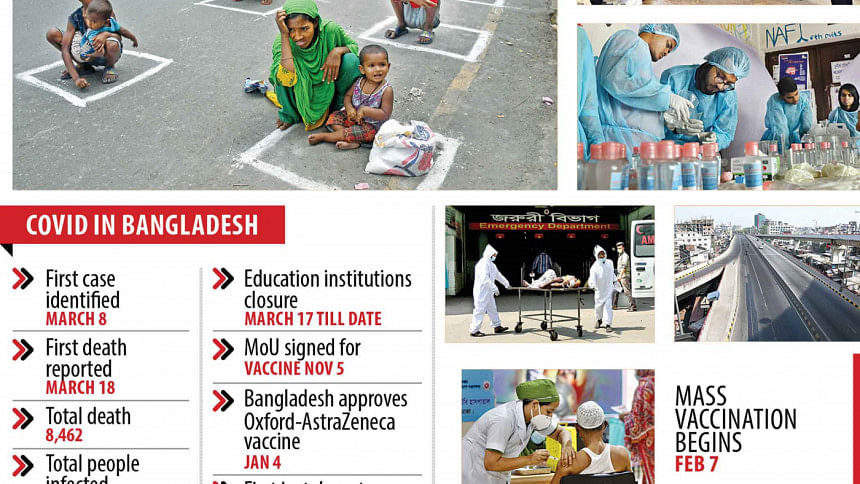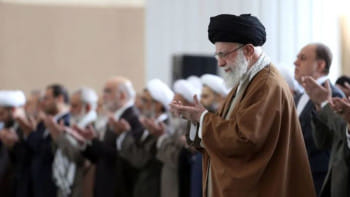A Year of Pandemic: Country on recovery trail

One year on, Bangladesh is well and truly on the recovery trail from the deep impacts the coronavirus pandemic has inflicted on life and livelihood.
With the vaccination campaign gathering pace, the fear of the invisible killer has subsided greatly, the lockdown has been lifted, economic activities have returned almost to the pre-pandemic level and health emergency alerts have been lowered. The government is all set to open educational institutions at the end of this month.
As the country puts all the efforts and energy in the fight against the pandemic, it appears focused on returning to the pre-pandemic way of life, notwithstandingthe fact that there are a lot of lessons to learn from the pandemic.
The coronavirus has been a part of our lives since it was first detected in the country on March 8 last year -- more than three months after it hit the Chinese city of Wuhan.
It has changed everyone's life. And each and everyone felt its impact -- from the richest to the poorest, from urban to rural areas, from industrialists to workers and from business tycoons to small entrepreneurs.
Face mask is now a necessary accessory and the demand for hand sanitiser has never been so high.Social distancing has become a new way of life.
In late March last year, economic activities came to a grinding halt due to worldwide restrictions on mobility, and educational institutions were closed to safeguard the future generation from the pandemic.
The otherwise bustling streets were deserted due to the lockdown enforced to save lives.
Students started learning remotely and work from home became a professional norm. Festivals, entertainment and sporting events were cancelled.
Hospitals became overcrowded with coronavirus patients, leaving the frontline professionals clueless about how to deal with such patients.
In the absence of a cure for the deadly virus, the procession of corpses grew longer with every passing day.
But after one year, the pertinent questions are how successful the country is in tackling the pandemic and what lessons it has learnt.
Going back to those initial uncertain and scary days, Bangladesh started badly.
With the limited availability of testing facilities, an acute crisis of personal protective gears and a lack of know-how in treating Covid patients made the situation worrisome in the early days. Corruption allegations in procurement of medical equipment, fake Covid certificates and poor enforcement of quarantine and lockdown made things even more complicated.
The government brought things under control by increasing testing facilities and Covid-dedicated hospitals, and formulating guidelines on treatment.
When many countries were struggling to collect Covid vaccines, Bangladesh excelled in this crucial front by securing vaccine doses for its people. The country has so far inoculated over 35 lakh people.
Be-Nazir Ahmed, former director (disease control) of the Directorate General of Health Services (DGHS), saidthe pandemic was not as severe in Bangladesh as it was in many other countries.
"From the public health point of view, if we dissect the pandemic, we can say it was not an extremely heavyburden for us. But if we could have stopped the air traffic earlier, the infection rate and also the causality would have been much lower."
The government has done all the necessary things, including tracing and testing, but not in time, Be-Nazir pointed out.
"Pandemic is a war-like situation where every minute counts. We enforced lockdown but did not get desired results because we withdrew it when the infection rate was on the rise."
The public health expert said scarcity of information also compounded the problem.
Warning that the pandemic is not over yet, he said, "The infection rate is increasing again in the country. If we fail to control it right now, it may surge once again like in the last summer."
Contacted, Health Minister Zahid Maleque said that when the pandemic hit the country, there were crises of equipment and manpower at hospitals, but the government's prompt decisions helped keep things under control.
The minister said they have successfully managed the situation despite some loopholes.
He further said the biggest challenge ahead is the smooth implementation of the mass vaccination campaign.
"We are not manufacturers [of Covid vaccines], so we have to rely on others. Since the government alone cannot do everything, private entities should be engaged. People have to come forward to help the government eradicate Covid from the country."
During the nationwide lockdown, millions lost jobs, poverty rate doubled to 42 percent from 20.5 percent and many businesses closed. Income of the vast majority of the population shrank.
Exports -- garment in particular -- hit rock bottom as the importing countries themselves were finding it difficult to keep their economies afloat. Bangladesh was staring at an unprecedented three-pronged crisis: health, economic and food.
But the country fared well beyond expectations on the economic front with remittance inflow remaining robust and the ever-deprived farmers keeping the food chain steady throughout last year.
The government has so far rolled out 23 bailout packages, announced at different times since March last year, to absorb the economic shock from the pandemic. The total amount of financial assistance now stands at Tk 124,053 crore -- 4.44 percent of the country's GDP.
Bangladesh's economic growth was 3.8 percent -- the third-highest in the world and the highest in Asia in 2020, according to the International Monetary Fund.
Evaluating the government efforts, eminent economist Hossain Zillur Rahman said the country has done well in handling the pandemic on the macroeconomic front, but a lot has to be done to revive the micro-economy.
"From the very beginning, we thought of economic recovery and that's why we were not hit badly. In terms of macroeconomy, we succeeded in tackling the pandemic. But when it comes to microeconomy, we were badly affected. Poverty rate increased and we are yet to return to the pre-pandemic status."
Zillur, also chairperson of Brac, said the key point is that the recovery is uneven in terms of macro-economy, especially in the service sector.
"In agriculture, we did a good job but farmers were hit hard due to the pandemic. The number of the new poor has increased. And the biggest challenge is human development.
There were no specific directives for the education and human development sectors during the pandemic. "It is a big question how these two issues will be addressed," he added.
In the wake of the pandemic, the government announced general holidays in late March and shut all the educational institutions from March 17 last year.
Though it introduced online classes, the move failed to make any impact. A study in January this year found that about 69.5 percent of the 2,952 students covered by a survey did not participate in distance learning and 57.9pc of them said they could not join classes due to a lack of devices.
Manzoor Ahmed, Prof Emeritus of Brac University, said the loss of an academic year is huge. Interim arrangements have not brought any success.
"We will need medium and long-term plans and have to implement those to make up for the losses."
He also said Covid has exposed the existing disparity and other problems in the education sector.
"We will need to go for a blended education approach. We will also need to work on the issue of connectivity and digital devices as well as the capacity of teachers."

 For all latest news, follow The Daily Star's Google News channel.
For all latest news, follow The Daily Star's Google News channel. 



Comments